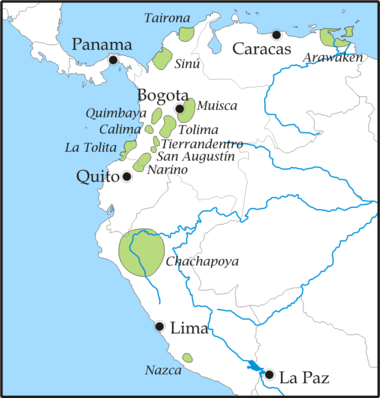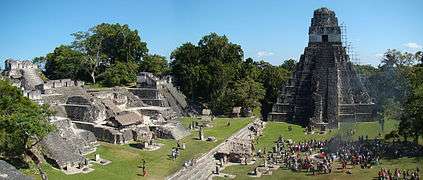List of pre-Columbian cultures

This list of pre-Columbian cultures includes those civilizations and cultures of the Americas which flourished prior to the European colonization of the Americas.
Cultural characteristics

Many pre-Columbian civilizations established permanent or urban settlements, agriculture, and complex societal hierarchies. In North America, indigenous cultures in the Lower Mississippi Valley during the Middle Archaic period built complexes of multiple mounds, with several in Louisiana dated to 5600–5000 BP (3700 BC–3100 BC). Watson Brake is considered the oldest, multiple mound complex in the Americas, as it has been dated to 3500 BC. It and other Middle Archaic sites were built by pre-ceramic, hunter-gatherer societies. They preceded the better known Poverty Point culture and its elaborate complex by nearly 2,000 years.[1] The Mississippi Valley mound-building tradition extended into the Late Archaic period, longer than later southeastern mound building dependent on sedentary, agricultural societies.(Russo, 1996:285)[1]
Some of these civilizations had long ceased to function by the time of the first permanent European arrivals (ca. late 15th – early 16th centuries), and are known only through archaeological investigations or oral history from nations today. Others were contemporary with this period, and are also known from historical accounts of the time. A few, such as the Olmec, Maya, Mixtec, and Nahua had their own written records. However, most Europeans of the time viewed such texts as heretical and burned most of them. Only a few documents were hidden and thus remain today, leaving modern historians with glimpses of ancient culture and knowledge.
From both indigenous American and European accounts and documents, American civilizations at the time of European encounter possessed many impressive attributes, having populous cities, and having developed theories of astronomy and mathematics.
Where they persist, the societies and cultures which gave rise to these civilizations continue to adapt and evolve; they also uphold various traditions and practices which relate back to these earlier times, even if combined with those more recently adopted.
A word on human sacrifice. This was a religious practice principally characteristic of pre-Columbian Aztec civilization although other Mesoamerican civilizations like the Maya and the Zapotec practiced it as well. The extent of the practice is debated by modern scholars.
Northern America
- Paleo-Indians, ca. 18,000–8000 BC
- Clovis culture, 11,500–11,000 BC, United States, Mexico, and Central America
- Folsom tradition
- Plano cultures
- Cody complex
- Archaic Period, 8000–1000 BC
- Paleo-Arctic Tradition, 8000–5000 BC, Alaska and Yukon
- Watson Brake and Lower Mississippi Valley mounds sites, 3500 BC–2800 BC, Louisiana, Mississippi and Florida
- Poverty Point culture, 2200 BC–700 BC, Lower Mississippi Valley and surrounding Gulf coast
- Post-archaic period, 1000 BC–onward
- Southwest:
- Ancestral Pueblo culture, 1200 BC–1300 AD, Utah, Arizona, Colorado, New Mexico—one of these cultural groups referred to as Anasazi
- Fremont culture, 1 AD–1300 AD, Utah and parts of Nevada, Idaho and Colorado
- Hohokam, 1 AD–1450 AD, Arizona
- Eastern Woodlands
- Woodland period, 1000 BC–1000 AD
- Adena, 1000–200 BC, Ohio, Indiana, West Virginia, Kentucky, and parts of Pennsylvania and New York.
- Hopewell culture, 200 BC–500 AD, Southeastern Canada and eastern United States
- Troyville culture, 400–700 AD, Louisiana and Mississippi
- Coles Creek culture, 700–1200 AD, Arkansas, Louisiana and Mississippi
- Plum Bayou culture, 700–1200 AD, Arkansas
- Mississippian culture, 800 AD–1500 AD, Midwestern, Eastern, and Southeastern United States
- Caborn-Welborn culture, 1400–1700 AD, Indiana and Kentucky.
- Caddoan Mississippian culture, 1000 AD–1650 AD, Eastern Oklahoma, Western Arkansas, Northeast Texas, and Northwest Louisiana.
- Fort Walton Culture, 1100–1550 AD, Florida.
- Leon-Jefferson Culture, 1100–1550 AD, Florida.
- Plaquemine culture, 1200–1730 AD, Louisiana and Mississippi.
- Upper Mississippian culture,
- Fort Ancient, 1000 AD–1650 AD, Ohio, Kentucky, West Virginia
- Oneota, 900–1650 AD, Iowa, Michigan, Minnesota and Missouri.
- Woodland period, 1000 BC–1000 AD
- Southwest:
Caribbean

- Ortoiroid people, ca. 5500—200 BC[2]
- Ciboney people, Greater Antilles, ca. 1000—301 BC[3]
- Guanahatabey, Cuba, 1000 BC
- Saladoid culture, 500 BC—545 AD[2]
- Ostionoid culture, 600—1500 AD[2]
- Arawak people, ca. 500–1500 BC[2]
Mesoamerica
in alphabetical order:
- Aztec, 1325–1521 AD, central Mexico
- Formative Period, 2500 BC–200 AD, La Blanca, Ujuxte, Monte Alto Culture, Mokaya Culture
- Huastec, 1000 BC–1500 AD, Hidalgo, Veracruz, San Luis Potosí and Tamaulipas
- Maya, 2600 BC–1697 AD, Mexican Southern states: Chiapas, Tabasco,Campeche and Yucatán Peninsula; Central America: Belize; Guatemala; El Salvador; Honduras
- Mixe, 400–present
- Mixtec, unknown–1600 AD, western Oaxaca
- Olmec, 1500–400 BC, Veracruz and Tabasco
- Purépecha Empire or Tarascan state, 1300–1530 AD, Michoacán
- Teotihuacán, 200 BC–800 AD, near Mexico City
- Teuchitlan tradition, 300 BC – 500 AD, north-central Jalisco
- Toltec, 900–1100 AD – may be mythical
- Totonac, unknown–1500 AD, eastern Mexico
- Western Mexico shaft tomb tradition, 1500–300 BC, Michoacan, Colima, Jalisco, Nayarit
- Western Mexico shaft tomb tradition, 300 BC–400 AD, Jalisco, Nayarit, and, to a lesser extent, Colima
- Zapotec, 500 BC–1500 AD, Oaxaca
Isthmo-Colombian area
- Cueva people, ?–1530 AD, Panama
- Diquis culture, 700–1530 AD, Costa Rica
South America
| Period | Dates | Cultures |
|---|---|---|
| Ceramic | ||
| Late Horizon | 1476 AD – 1534 AD | Ecuador, Peru, Bolivia, Argentina, Chile, and Colombia: Inca Empire; Brazil: Cambeba; Colombia: Muisca Confederation |
| Late Intermediate | 1000 AD – 1476 AD | Bolivia: Aymara nations; Colombia: Muisca, Nariño, Tairona; Ecuador: Los Huancavilca, Kingdom of Quito, Manteño, Nariño; Peru: Chimú, Chincha, Cajamarca, Chiribaya, Piura, Chancay, Chachapoyas, Chiribaya, Chucuito, Huaman Huilca, Ilo, Lupaca, Qotu Qotu, Pacacocha, Palli Marca, Piura, Sican, Tajaraca, Huaylas, Conchucos, Huamachuco, Rucanas, Chanka, Ayabaca, Bracamoros, Huancabambas, Tallan culture, Huarco, Ichma, Parinacota, Cuntis, Chinchaycochas, Huarochiri, Kheswas, Tarmas, Paltas, Camanas |
| Middle Horizon | 600 AD – 1000 AD | Bolivia: Tiwanaku; Brazil: Marajoara culture; Colombia: Cauca culture, Herrera, Nariño, Quimbaya, Tairona; Ecuador: Cañari culture, Nariño; Peru: Huari, Piura |
| Early Intermediate | 200 AD–600 AD | Bolivia: Tiwanaku; Colombia: Herrera, Quimbaya, San Agustín, Tairona, Tierradentro, Tolima; Ecuador: La Bahía, Cara, Quitu; Peru: Moche, Nazca, Lima, Pechiche, Piura |
| Early Horizon | 900 BC–200 AD | Colombia: Calima culture (200 BC–400 AD), Herrera; Ecuador: Chorrera, La Tolita; Peru: Chavín, Cupisnique, Late Chiripa, Paracas, Pechiche, Sechura, Xakse |
| Initial Period | 1800/1500 BC – 900 BC | Ecuador: Cotocollao; Machalilla; Peru: Early Chiripa, Kotosh, Toríl (The Cumbe Mayo aqueduct was built ca. 1000 BC), Argentina: Tehuelches (?-1820) |
| Preceramic | ||
| Period VI | 2500 BC – 1500/1800 BC | Ecuador: Valdivia; Peru: Casma/Sechin culture, Norte Chico (Caral), Buena Vista, Casavilca, Culebras, Ventarrón, Viscachani, Huaca Prieta; Peru, Chile: Chinchorro |
| Period V | 4200 BC – 2500 BC | Ecuador: Valdivia; Peru: Honda, Lauricocha III, Viscachani; Peru, Chile: Chinchorro |
| Period IV | 6000 BC – 4200 BC | Peru: Ambo, Canario, Siches, Lauricocha II, Luz, Toquepala II; Peru, Chile: Chinchorro |
| Period III | 8000 BC – 6000 BC | Ecuador: Las Vegas, 8000–4600 BC; Peru: Arenal, Chivateros II, Lauricocha I, Playa Chira, Puyenca, Toquepala I; Peru, Chile: Chinchorro |
| Period II | 9500 BC – 8000 BC | Ecuador: El Inga; Peru: Chivateros I, Lauricocha I |
| Period I | ? BC – 9500 BC | Colombia: El Abra, (12,500–10,000 BC); Peru: Oquendo, Red Zone (central coast; Argentina & Chile: Patagonia |
See also
- Indigenous peoples of the Americas – for coverage on present-day indigenous peoples
- Lithic stage in Canada
- Cultural periods of Peru
- Pre-Columbian Ecuador
- Classification of indigenous peoples of the Americas
References
- 1 2 Robert W. Preucel, Stephen A. Mrozowski, Contemporary Archaeology in Theory: The New Pragmatism, John Wiley and Sons, 2010, p. 177
- 1 2 3 4 5 6 7 8 9 10 "Prehistory of the Caribbean Culture Area." Southeast Archaeological Center. (retrieved 9 July 2011)
- ↑ "Aboriginal Roots of Cuban Culture." (retrieved 9 July 2011)
- ↑ John Albert Bullbrook, The aboriginal remains of Trinidad and the West Indies, A. L. Rhodes, Port of Spain, Trinidad, 1941
- ↑ John Albert Bullbrook, The Ierian Race, Historical Society of Trinidad and Tobago, Port of Spain, Trinidad, 1940
External links
| Wikimedia Commons has media related to Pre-Columbian cultures. |
- National Museum of the American Indian, collections search
- Pre-Columbian cultures in present-day United States, Four Directions Institute

.svg.png)


